
The Habit That Can Save Your Life: Recognizing the Advantages of Hand Washing
It’s easy to ignore small habits that might have a big impact on our health in our hectic daily lives. Among these is hand washing, which is something that most people do without giving it much thought. However, did you realize that one little deed can truly safeguard entire communities, prevent diseases, and save lives? It really is that strong.
Let’s examine the various advantages of hand washing, why it’s more important than we think, and the correct technique to ensure that we’re really protected.
The Importance of Hand Washing
We move our hands all the time when we open doors, use phones, type on keyboards, shake hands, cook, and more. Numerous bacteria, viruses, and other pathogens that can readily enter our bodies through contact with our face, eyes, mouth, or nose are encountered by them during these activities.
Hand washing acts as a shield, keeping us healthy by warding off these unseen intruders. It is the most straightforward, economical, and efficient method of halting the spread of illnesses.

Hand Washing: The Science Behind It
The Centers for Disease Control and Prevention (CDC) state that frequent soap washing eliminates germs from hands. This stops the spread of diseases from one person to another in addition to preventing infections.
The oils on our hands that harbor germs are broken down by the combination of soap and water. washing them off after rinsing with fresh water. This procedure can cut the number of dangerous microorganisms by up to 99% when carried out properly!
The Main Advantages of Hand Washing
Avoids Typical Illnesses
Preventing diseases like these is one of the most obvious and significant advantages of hand washing.
The common cold
Flu, or influenza
COVID-19
Norovirus and other stomach viruses
Diarrheal illnesses
The likelihood of becoming ill increases dramatically when we come into contact with infected surfaces and then touch our face or food. However, the risk significantly decreases when the hands are clean.
Stops Respiratory Infections from Spreading
Sneezes and coughs can release viral droplets onto surfaces or into the air. We can quickly become infected if we touch certain surfaces and then our mouth or nose.
According to international health studies, hand washing lowers the incidence of respiratory infections by roughly 16–21%. That’s significant, particularly when there is a pandemic or flu season.
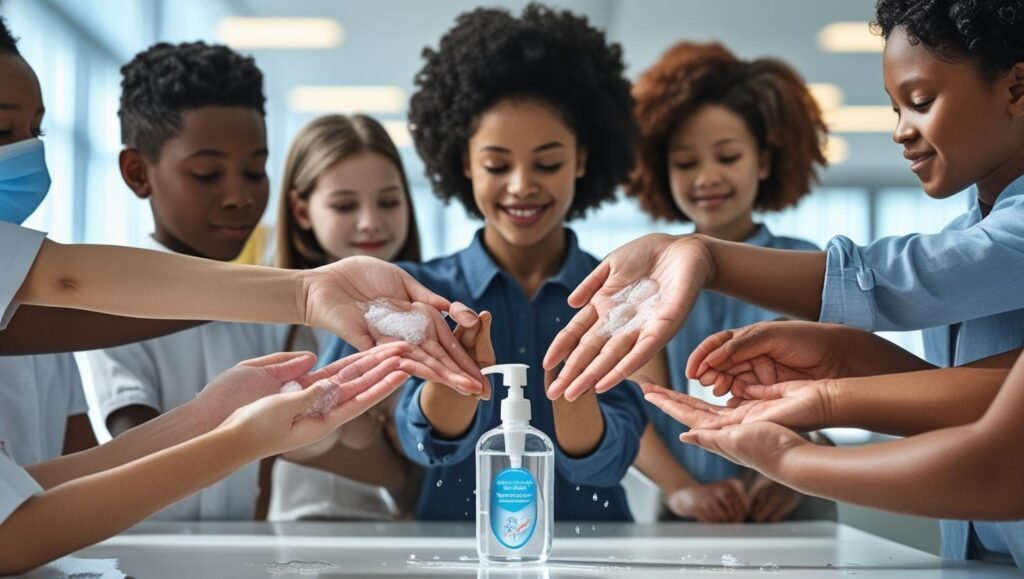
Safeguards the Health of Children
Youngsters are particularly susceptible to infections. They are more prone to put their hands in their mouths and have immature immune systems. The amount of sick days and medical visits can be considerably decreased by teaching kids the habit of washing their hands.
Indeed, research indicates that teaching students to wash their hands in class can cut absenteeism by as much as 50%!
Prevents the Transmission of Diarrheal Illnesses
Although it can seem like a small problem, diarrhea poses a major health risk in many regions of the world, particularly for young children. Lack of sanitation and inadequate hygiene can lead to diarrheal illnesses.
In vulnerable areas, hand washing with soap can literally mean the difference between life and death by reducing the frequency of diarrhea by around 30 to 40%.
Preserves Food Safety
Unwashed hands might spread germs to the food we eat while preparing it. Gastrointestinal illnesses and food poisoning may result from this. Clean hands are essential whether you’re cooking at home, in a restaurant, or in the school cafeteria.
To avoid cross-contamination, food handlers should always wash their hands before and after handling raw meat, poultry, or shellfish.
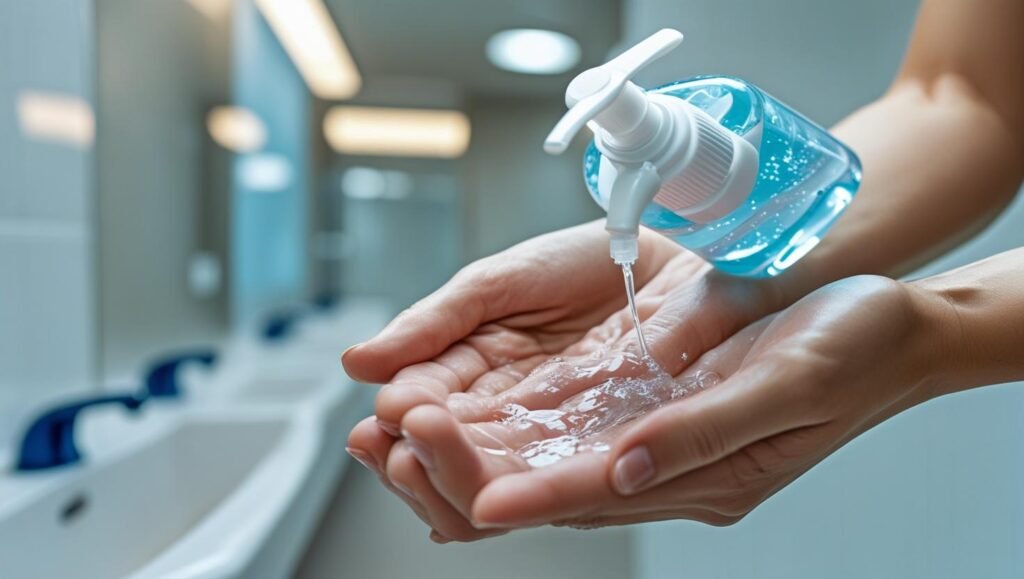
Boosts Productivity at Work
Missed work, decreased productivity, and increased health care expenses are all consequences of sick personnel. Promoting hand hygiene at work can result in happier workers and a more productive workplace.
Workplaces that encourage hand washing report lower rates of sickness outbreaks and improved employee wellbeing in general.
Lowers Infections Associated with Healthcare
Hand washing is one of the most crucial procedures for avoiding healthcare-associated infections (HAIs) in clinics and hospitals. Hand washing is taught to nurses, physicians, and other caregivers both before and after each patient encounter.
In medical settings, practicing good hand hygiene can greatly slow the spread of dangerous illnesses including sepsis, MRSA, and even surgical wound infections.
Develops a Health-Aware Culture
There are repercussions when hand washing becomes a common practice in a community. Public areas, workplaces, and schools get safer and cleaner. During flu seasons, people start to pay more attention to general hygiene, which includes avoiding needless handshakes and using hand sanitizers.
It becomes a community obligation and goes beyond personal health.
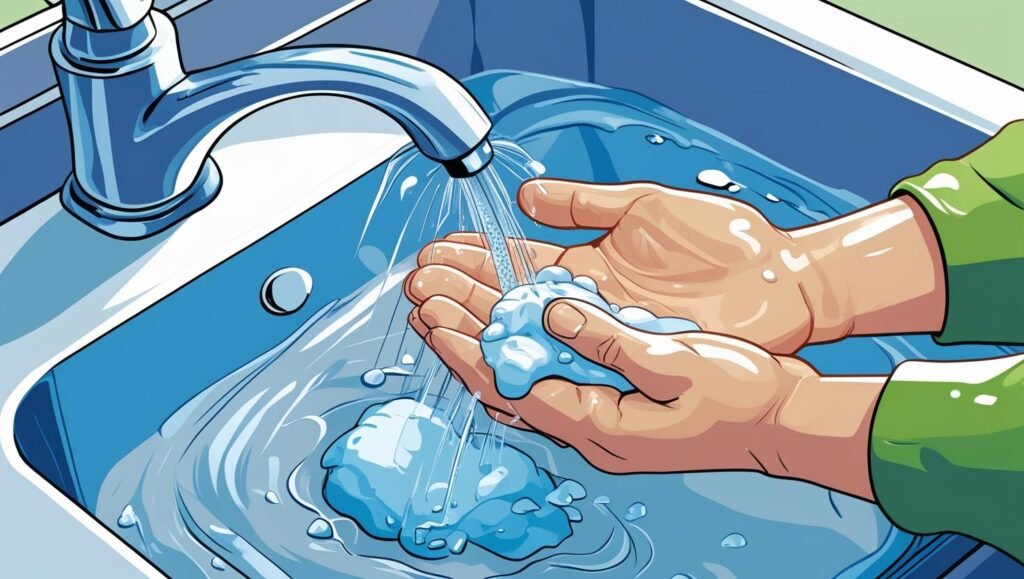
The Proper Method for Hand Washing
It is insufficient to simply rinse your hands under water for a brief moment. This is the correct way to accomplish it:
Detailed Instructions:
Clean, cold or warm running water should be used to wet your hands.
Pay close attention to the backs of your hands, the spaces between your fingers, and the area behind your nails when you apply soap and lather.
Spend at least 20 seconds cleaning; you can hum “Happy Birthday” twice throughout that time.
Rinse well under running, clean water.
Use a fresh towel or let it air dry.
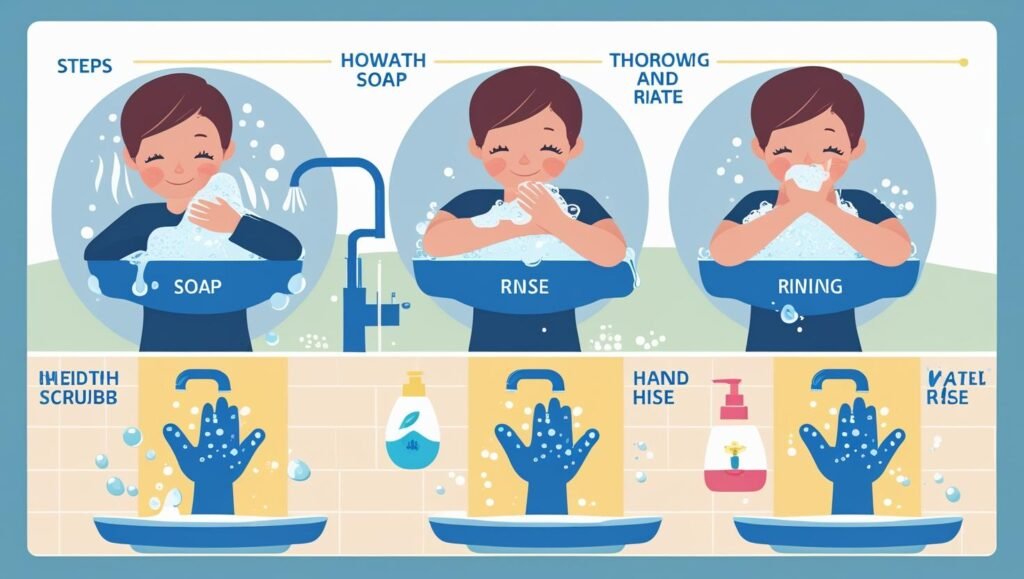
When Is the Right Time to Wash Your Hands?
Hand cleaning is particularly crucial during the following crucial periods:
Prior to consuming or cooking food
Following a bathroom visit
Following a cough, sneeze, or nose blow
After coming into contact with trash
Following contact with animals or pet food
Following exposure to public areas (such as supermarkets or public transportation),
Prior to and following the provision of medical care
Prior to and following wound care
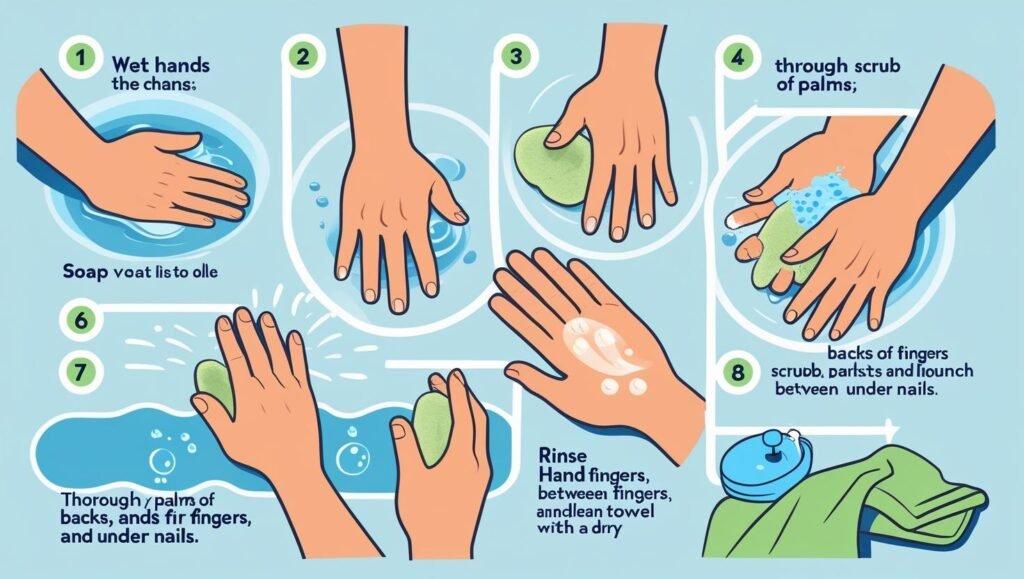
What Happens If Water and Soap Aren’t Available?
A hand sanitizer containing at least 60% alcohol should be used. In most cases, it helps, even though it isn’t as effective as soap and water against some pathogens (like norovirus).
Rub your hands until they are completely dry, about 20 seconds after applying enough sanitizer to cover all of their surfaces.
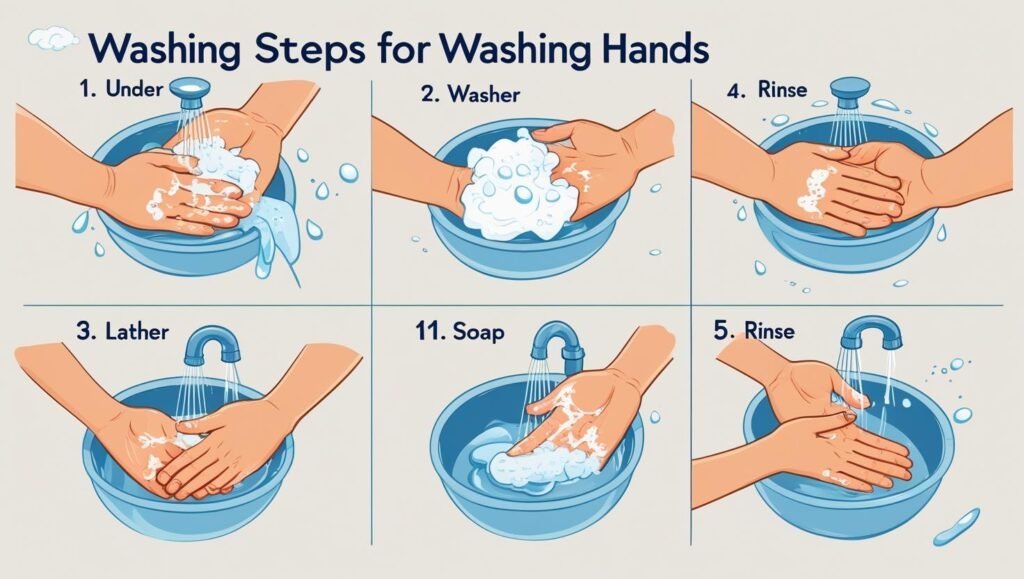
Concluding Remarks: Little Habit, Large Effect
Although it may seem insignificant, hand washing is one of the most effective ways we can avoid getting sick. It safeguards you, your loved ones, and your community and is inexpensive, simple, and available.
Hand hygiene is an effective first line of defense in a world where new bacteria and viruses are constantly emerging.
Therefore, take your time the next time you wash your hands. It’s worth the extra few seconds for your health.
Remember to wash your hands, keep safe, and maintain your health.





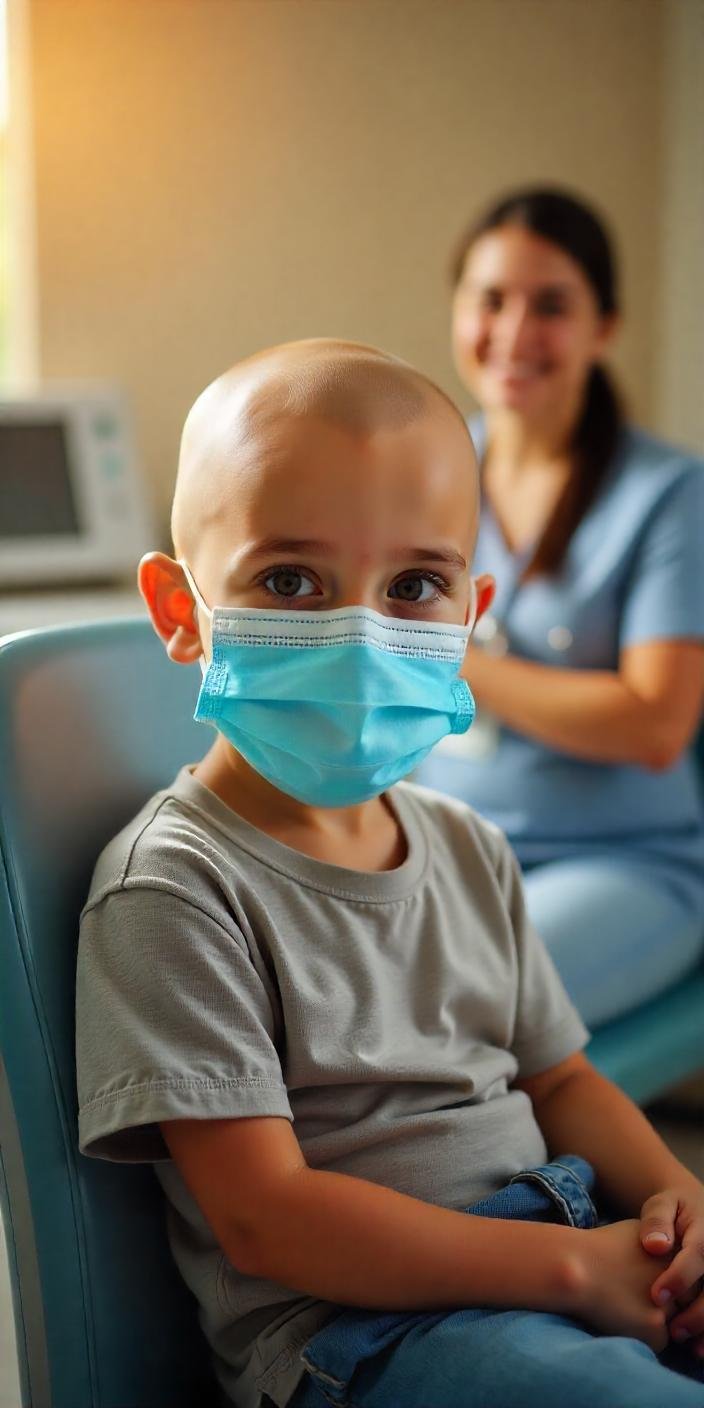

Leave a Reply